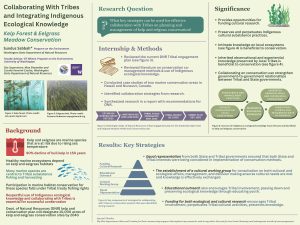COLLABORATING WITH TRIBES AND INTEGRATING INDIGENOUS ECOLOGICAL KNOWLEDGE INTO PLANNING AND MANAGEMENT OF KELP AND EELGRASS CONSERVATION
The Washington State Department of Natural Resources is currently developing the Statewide Kelp Forest and Eelgrass Meadow Health and Conservation Plan which will be submitted in September 2023. This plan will establish 10,000 acres of kelp forest and eelgrass meadow conservation sites throughout Puget Sound and on the Washington State coastline. Kelp and eelgrass are essential to the health of marine ecosystems and are culturally significant to Tribes in Washington. The decline of these species negatively impacts populations of fish and shellfish that are central to Tribal subsistence fishing and harvesting practices, and Tribes should have equal opportunity to participate and co-manage the conservation of these species. The purpose of my internship was to identify strategies for engaging and collaborating with Tribes on kelp and eelgrass conservation, and how Indigenous ecological knowledge may be integrated into the planning and management of conservation activities. In order to identify effective strategies, I conducted research on literature discussing the use of Indigenous ecological knowledge and its application to conservation projects. I also conducted a case study on two marine conservation areas that have successfully collaborated with local Indigenous people in conservation planning and management. In my presentation I will discuss key strategies that I have identified that have been proven effective in the planning and management of marine conservation areas, and how they may be integrated into the Statewide Kelp Forest and Eelgrass Meadow Health and Conservation Plan in Washington State.
